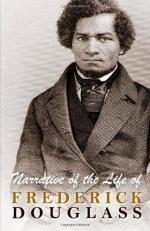ever to have given a negative answer; nor did I, in
pursuing this course, consider myself as uttering
what was absolutely false; for I always measured the
kindness of my master by the standard of kindness
set up among slaveholders around us. Moreover,
slaves are like other people, and imbibe prejudices
quite common to others. They think their own better
than that of others. Many, under the influence
of this prejudice, think their own masters are better
than the masters of other slaves; and this, too, in
some cases, when the very reverse is true. Indeed,
it is not uncommon for slaves even to fall out and
quarrel among themselves about the relative goodness
of their masters, each contending for the superior
goodness of his own over that of the others.
At the very same time, they mutually execrate their
masters when viewed separately. It was so on our
plantation. When Colonel Lloyd’s slaves
met the slaves of Jacob Jepson, they seldom parted
without a quarrel about their masters; Colonel Lloyd’s
slaves contending that he was the richest, and Mr.
Jepson’s slaves that he was the smartest, and
most of a man. Colonel Lloyd’s slaves would
boast his ability to buy and sell Jacob Jepson.
Mr. Jepson’s slaves would boast his ability
to whip Colonel Lloyd. These quarrels would almost
always end in a fight between the parties, and those
that whipped were supposed to have gained the point
at issue. They seemed to think that the greatness
of their masters was transferable to themselves.
It was considered as being bad enough to be a slave;
but to be a poor man’s slave was deemed a disgrace
indeed!
CHAPTER IV
Mr. Hopkins remained but a short time in the office
of overseer. Why his career was so short, I do
not know, but suppose he lacked the necessary severity
to suit Colonel Lloyd. Mr. Hopkins was succeeded
by Mr. Austin Gore, a man possessing, in an eminent
degree, all those traits of character indispensable
to what is called a first-rate overseer. Mr.
Gore had served Colonel Lloyd, in the capacity of overseer,
upon one of the out-farms, and had shown himself worthy
of the high station of overseer upon the home or Great
House Farm.
Mr. Gore was proud, ambitious, and persevering.
He was artful, cruel, and obdurate. He was just
the man for such a place, and it was just the place
for such a man. It afforded scope for the full
exercise of all his powers, and he seemed to be perfectly
at home in it. He was one of those who could
torture the slightest look, word, or gesture, on the
part of the slave, into impudence, and would treat
it accordingly. There must be no answering back
to him; no explanation was allowed a slave, showing
himself to have been wrongfully accused. Mr. Gore
acted fully up to the maxim laid down by slaveholders,—“It
is better that a dozen slaves should suffer under
the lash, than that the overseer should be convicted,
in the presence of the slaves, of having been at fault.”




